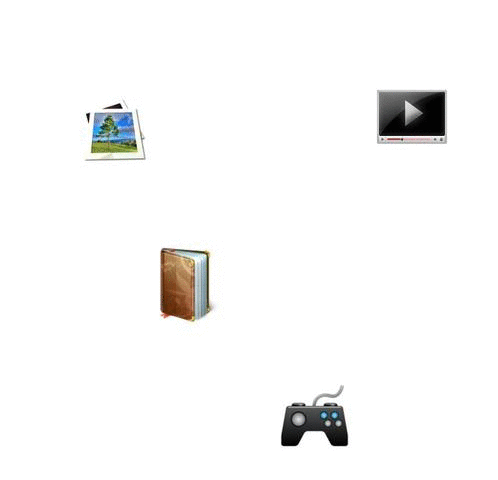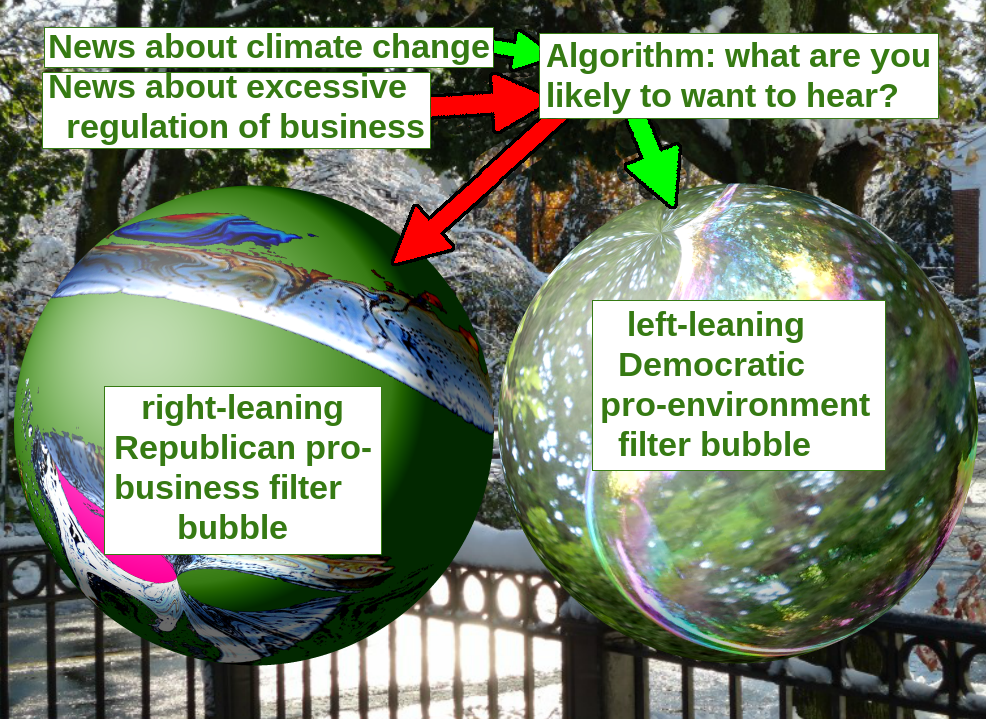|
Daily Me
Daily ME is a term that describes a virtual daily newspaper customized for an individual's tastes. This term was popularized by MIT Media Lab founder Nicholas Negroponte. The term has also been associated with the phenomenon of individuals customizing and personalizing their news feeds, resulting in their being exposed only to content they are already inclined to agree with. The Daily Me is a term popularized by MIT Media Lab founder Nicholas Negroponte to describe a virtual daily newspaper customized for an individual's tastes. Negroponte discusses it in his 1995 book, ''Being Digital'', referencing a project under way at the Media Lab, Fishwrap. Designed by Pascal Chesnais and Walter Bender and implemented by Media Lab students, the system allowed a greater deal of customization than commercially available systems in 1997. Fred Hapgood, in a 1995 article in ''Wired'', credited the concept and phrase to Negroponte's thinking in the 1970s. In 2005, Eduardo Hauser, a Venezuelan ... [...More Info...] [...Related Items...] OR: [Wikipedia] [Google] [Baidu] |
MIT Media Lab
The MIT Media Lab is a research laboratory at the Massachusetts Institute of Technology, growing out of MIT's Architecture Machine Group in the School of Architecture. Its research does not restrict to fixed academic disciplines, but draws from technology, media, science, art, and design. , Media Lab's research groups include neurobiology, biologically inspired fabrication, socially engaging robots, emotive computing, bionics, and hyperinstruments. The Media Lab was founded in 1985 by Nicholas Negroponte and former MIT President Jerome Wiesner, and is housed in the Wiesner Building (designed by I. M. Pei), also known as Building E15. The Lab has been written about in the popular press since 1988, when Stewart Brand published ''The Media Lab: Inventing the Future at M.I.T.'', and its work was a regular feature of technology journals in the 1990s. In 2009, it expanded into a second building. The Media Lab came under scrutiny in 2019 due to its acceptance of donations from ... [...More Info...] [...Related Items...] OR: [Wikipedia] [Google] [Baidu] |
Salon
Salon may refer to: Common meanings * Beauty salon, a venue for cosmetic treatments * French term for a drawing room, an architectural space in a home * Salon (gathering), a meeting for learning or enjoyment Arts and entertainment * Salon (Paris), a prestigious annual juried art exhibition in Paris begun under Louis XIV * ''The Salon'' (TV series), a British reality television show * ''The Salon'' (film), a 2005 American dramatic comedy movie * ''The Salon'' (comics), a graphic novel written and illustrated by Nick Bertozzi Places * Salon, Aube, France, a commune * Salon, Dordogne, France, a commune * Salon, India, a town and nagar panchayat * Salon (Assembly constituency), India, a constituency for the Uttar Pradesh Legislative Assembly Other uses * Salon.com, an online magazine * Champagne Salon, a producer of sparkling wine * Salon Basnet (born 1991), Nepali actor and model See also * * Salon-de-Provence, France, a commune * Salon-la-Tour, France, a commune * Sa ... [...More Info...] [...Related Items...] OR: [Wikipedia] [Google] [Baidu] |
Emergence
In philosophy, systems theory, science, and art, emergence occurs when an entity is observed to have properties its parts do not have on their own, properties or behaviors that emerge only when the parts interact in a wider whole. Emergence plays a central role in theories of integrative levels and of complex systems. For instance, the phenomenon of life as studied in biology is an emergent property of chemistry. In philosophy, theories that emphasize emergent properties have been called emergentism. In philosophy Philosophers often understand emergence as a claim about the etiology of a system's properties. An emergent property of a system, in this context, is one that is not a property of any component of that system, but is still a feature of the system as a whole. Nicolai Hartmann (1882–1950), one of the first modern philosophers to write on emergence, termed this a ''categorial novum'' (new category). Definitions This concept of emergence dates from at least the ... [...More Info...] [...Related Items...] OR: [Wikipedia] [Google] [Baidu] |
Recommendation System
A recommender system, or a recommendation system (sometimes replacing 'system' with a synonym such as platform or engine), is a subclass of information filtering system that provide suggestions for items that are most pertinent to a particular user. Typically, the suggestions refer to various decision-making processes, such as what product to purchase, what music to listen to, or what online news to read. Recommender systems are particularly useful when an individual needs to choose an item from a potentially overwhelming number of items that a service may offer. Recommender systems are used in a variety of areas, with commonly recognised examples taking the form of playlist generators for video and music services, product recommenders for online stores, or content recommenders for social media platforms and open web content recommenders.Pankaj Gupta, Ashish Goel, Jimmy Lin, Aneesh Sharma, Dong Wang, and Reza Bosagh ZadeWTF:The who-to-follow system at Twitter Proceedings of the ... [...More Info...] [...Related Items...] OR: [Wikipedia] [Google] [Baidu] |
Filter Bubble
A filter bubble or ideological frame is a state of intellectual isolationTechnopediaDefinition – What does Filter Bubble mean?, Retrieved October 10, 2017, "....A filter bubble is the intellectual isolation, that can occur when websites make use of algorithms to selectively assume the information a user would want to see, and then give information to the user according to this assumption ... A filter bubble, therefore, can cause users to get significantly less contact with contradicting viewpoints, causing the user to become intellectually isolated...." that can result from personalized searches when a website algorithm selectively guesses what information a user would like to see based on information about the user, such as location, past click-behavior, and search history.Website visitor tracking As a result, users become separated from information that disagrees with their viewpoints, effectively isolating them in their own cultural or ideological bubbles. The choices made by ... [...More Info...] [...Related Items...] OR: [Wikipedia] [Google] [Baidu] |
Collaborative Filtering
Collaborative filtering (CF) is a technique used by recommender systems.Francesco Ricci and Lior Rokach and Bracha ShapiraIntroduction to Recommender Systems Handbook Recommender Systems Handbook, Springer, 2011, pp. 1-35 Collaborative filtering has two senses, a narrow one and a more general one. In the newer, narrower sense, collaborative filtering is a method of making automatic predictions (filtering) about the interests of a user by collecting preferences or taste information from many users (collaborating). The underlying assumption of the collaborative filtering approach is that if a person ''A'' has the same opinion as a person ''B'' on an issue, A is more likely to have B's opinion on a different issue than that of a randomly chosen person. For example, a collaborative filtering recommendation system for preferences in television programming could make predictions about which television show a user should like given a partial list of that user's tastes (likes or dislikes ... [...More Info...] [...Related Items...] OR: [Wikipedia] [Google] [Baidu] |
Windows Phone
Windows Phone (WP) is a discontinued family of mobile operating systems developed by Microsoft for smartphones as the replacement successor to Windows Mobile and Zune. Windows Phone featured a new user interface derived from the Metro design language. Unlike Windows Mobile, it was primarily aimed at the consumer market rather than the enterprise market. It was first launched in October 2010 with Windows Phone 7. Windows Phone 8 succeeded it in 2012, replacing the Windows CE-based kernel of Windows Phone 7 with the Windows NT kernel used by the PC versions of Windows (and, in particular, a large amount of internal components from Windows 8). Due to these changes, the OS was incompatible with all existing Windows Phone 7 devices, although it still supported apps originally developed for Windows Phone 7. In 2014, Microsoft released the Windows Phone 8.1 update, which introduced the Cortana virtual assistant, and Windows Runtime platform support to create cross-platform apps betwee ... [...More Info...] [...Related Items...] OR: [Wikipedia] [Google] [Baidu] |
Android (operating System)
Android is a mobile operating system based on a modified version of the Linux kernel and other open-source software, designed primarily for touchscreen mobile devices such as smartphones and tablets. Android is developed by a consortium of developers known as the Open Handset Alliance and commercially sponsored by Google. It was unveiled in November 2007, with the first commercial Android device, the HTC Dream, being launched in September 2008. Most versions of Android are proprietary. The core components are taken from the Android Open Source Project (AOSP), which is free and open-source software (FOSS) primarily licensed under the Apache License. When Android is installed on devices, the ability to modify the otherwise free and open-source software is usually restricted, either by not providing the corresponding source code or by preventing reinstallation through technical measures, thus rendering the installed version proprietary. Most Android devices ship with additional ... [...More Info...] [...Related Items...] OR: [Wikipedia] [Google] [Baidu] |
Zite
Flipboard is a news aggregator and social network aggregation company based in Palo Alto, California, with offices in New York, Vancouver, and Bejiing. Its software, also known as Flipboard, was first released in July 2010. It aggregates content from social media, news feeds, photo sharing sites, and other websites, presents it in magazine format, and allows users to "flip" through the articles, images, and videos being shared. Readers can also save stories into Flipboard magazines. As of March 2016 the company claims there have been 28 million magazines created by users on Flipboard. The service can be accessed via web browser, or by a Flipboard application for Microsoft Windows and macOS, and via mobile apps for iOS and Android. The client software is available at no charge and is localized in 21 languages. History The original launch of Flipboard in 2010 was exclusively for iPad. It launched the iPhone and iPod Touch versions seventeen months later in December 2011. The ... [...More Info...] [...Related Items...] OR: [Wikipedia] [Google] [Baidu] |
International Journal On Semantic Web And Information Systems
The ''International Journal on Semantic Web and Information Systems'' (IJSWIS) is a quarterly peer-reviewed academic journal covering the semantic web and information systems. It was established in 2005 and is published by IGI Global. The editor-in-chief are Miltiadis D. Lytras ( The American College of Greece, Greece) and Brij Gupta (National Institute of Technology, Kurukshetra National Institute of Technology Kurukshetra (NIT Kurukshetra or NITKKR) is a public technical and research university located in Kurukshetra. In December 2008, it was accredited with the status of Institute of National Importance (INI). It i ..., India). Abstracting and indexing The journal is abstracted and indexed in: References External links * Publications established in 2005 English-language journals Quarterly journals Semantic Web and Information Systems, International Journal on Computer science journals Semantic Web Information systems journals {{compu-journal-stub ... [...More Info...] [...Related Items...] OR: [Wikipedia] [Google] [Baidu] |
Tyranny Of The Majority
The tyranny of the majority (or tyranny of the masses) is an inherent weakness to majority rule in which the majority of an electorate pursues exclusively its own objectives at the expense of those of the minority factions. This results in oppression of minority groups comparable to that of a tyrant or despot, argued John Stuart Mill in his 1859 book ''On Liberty''. The scenarios in which tyranny perception occurs are very specific, involving a sort of distortion of democracy preconditions: * Centralization excess: when the centralized power of a federation make a decision that should be ''local'', breaking with the commitment to the subsidiarity principle.Lacy K. Ford Jr., "Inventing the Concurrent Majority: Madison, Calhoun, and the Problem of Majoritarianism in American Political Thought", ''The Journal of Southern History,'' Vol. 60, No. 1 (Feb., 1994), pp. 19–5in JSTOR/ref> Typical solutions, in this condition, are concurrent majority and supermajority rules. * Aban ... [...More Info...] [...Related Items...] OR: [Wikipedia] [Google] [Baidu] |
.jpg)





.png)